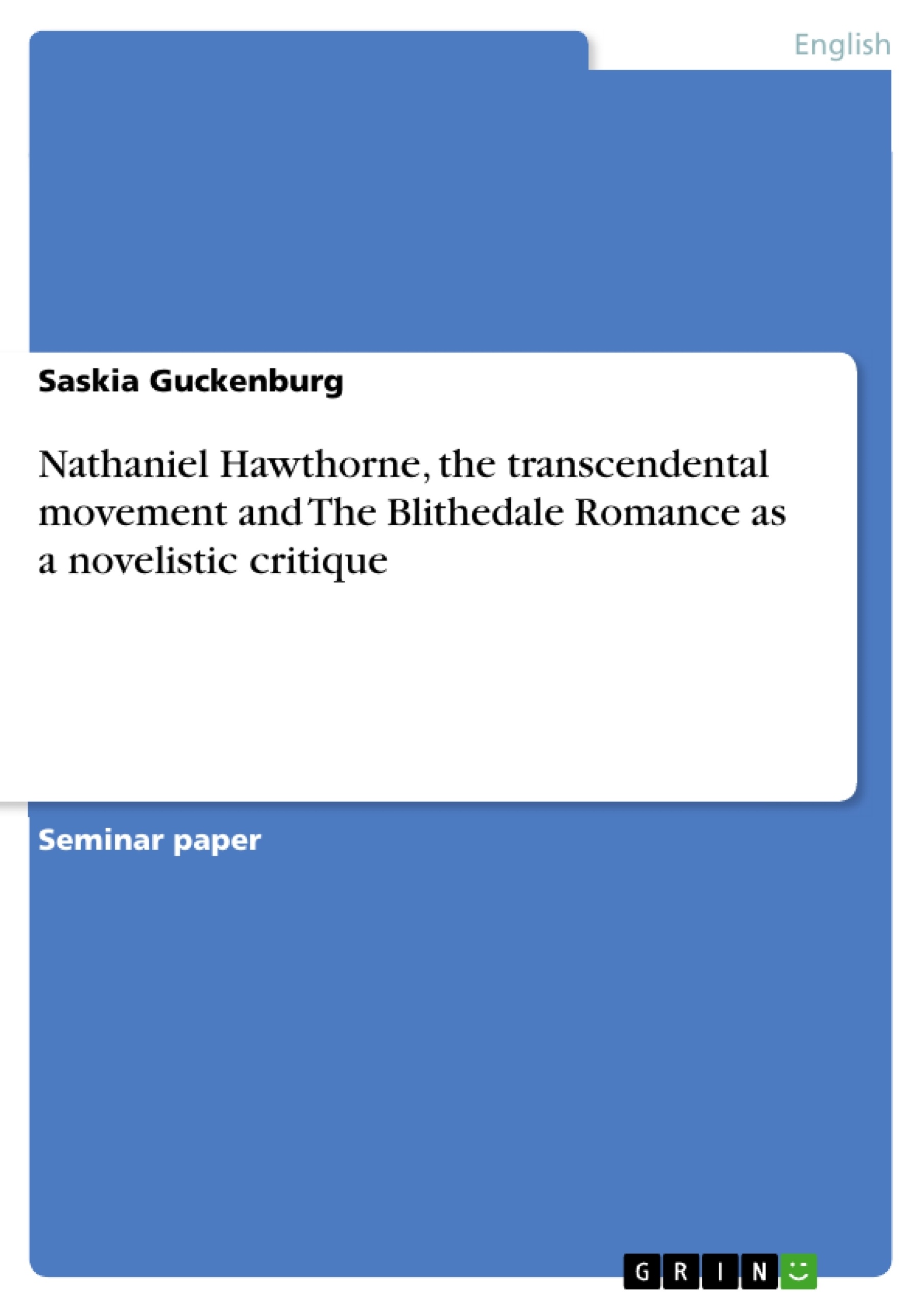The paper is divided into two main sections. The first section informs about the historical background of the transcendental movement, its central ideas and its main followers. Further, basic information about Hawthorne’s attitude towards transcendentalism and his stay at Brook Farm is given. The second section, which covers three parts, focuses on Hawthorne’s The Blithedale Romance. The first part concentrates on Coverdale’s critical pessimism towards the social experiment. Here, the naiveté of the reform approach and the omnipresent theme of masquerading are in the center of consideration. The second part deals with the transcendental elevation of nature. In this context, the juxtaposition between urban and natural environments within the novel as well as the depiction of mesmerism and the expected benefits of farm work are discussed. The third part centers on the transcendental tenet of self-reliance, which is differentiated between the utopia of communal and individual self-reliance.
Table of Contents
- Introduction
- Transcendentalism and its historical background
- Faith in human potential and main thinkers
- Hawthorne's relation to transcendentalism
- The Brook Farm experiment
- The Blithedale Romance – a subverted utopia
- Coverdale's pessimism and harbingers of failure
- Egotists and the naiveté of dreamers
- The leitmotif of masquerading
- Nature as a catalyst to God
- Divinity of nature in contrast to urban life
- Farm work as a key to transcendental experience
- Opportunities and risks of mesmerism
- The doctrine of self-reliance
- Communal autarky
- Hollingsworth's misguided principle self-reliance
Objectives and Key Themes
This paper delves into Nathaniel Hawthorne's The Blithedale Romance, examining its critical perspective on the Transcendentalist movement. Through an analysis of the novel's plot and characters, the paper explores the historical context of Transcendentalism, Hawthorne's own experiences at Brook Farm, and the novel's portrayal of key Transcendentalist ideas.
- The historical background and main tenets of Transcendentalism
- Hawthorne's relationship with Transcendentalism and his experience at Brook Farm
- The novel's depiction of Transcendentalist ideals, including the emphasis on human potential, nature, and self-reliance
- The novel's critique of Transcendentalist utopianism and its exploration of the complexities of human nature
- The role of Coverdale as a narrator and his perspective on the Blithedale experiment
Chapter Summaries
The paper begins with a historical overview of Transcendentalism, its origins in Romanticism and German Idealism, and its core beliefs. It also examines the influence of Transcendentalism on Hawthorne, including his stay at Brook Farm.
The following section focuses on The Blithedale Romance, exploring Coverdale's critical view of the utopian experiment. It analyzes the characters' naiveté and the pervasive theme of masquerading. The paper then examines the novel's portrayal of nature as a catalyst to God, highlighting the contrast between urban and natural environments, the significance of farm work, and the complex role of mesmerism.
The final section delves into the Transcendentalist concept of self-reliance, exploring both communal and individual approaches to self-sufficiency, and analyzing Hollingsworth's misguided interpretation of this principle.
Keywords
The main keywords and themes explored in this paper include: Transcendentalism, The Blithedale Romance, Nathaniel Hawthorne, Brook Farm, utopia, critique, self-reliance, nature, human potential, and the individual versus society.
- Quote paper
- B.A. Saskia Guckenburg (Author), 2013, Nathaniel Hawthorne, the transcendental movement and The Blithedale Romance as a novelistic critique, Munich, GRIN Verlag, https://www.grin.com/document/265526




